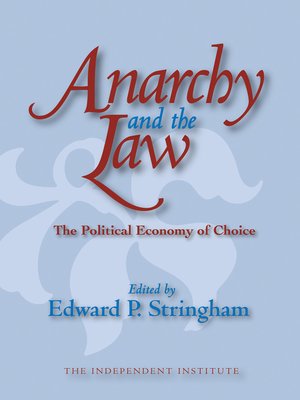Anarchy and the Law
ebook ∣ The Political Economy of Choice · Independent Studies in Political Economy
By Edward P. Stringham

Sign up to save your library
With an OverDrive account, you can save your favorite libraries for at-a-glance information about availability. Find out more about OverDrive accounts.
Find this title in Libby, the library reading app by OverDrive.



Search for a digital library with this title
Title found at these libraries:
| Library Name | Distance |
|---|---|
| Loading... |
Private-property anarchism, also known as anarchist libertarianism, individualist anarchism, and anarcho-capitalism, is a political philosophy and set of economic and legal arguments that maintains that, just as the markets and private institutions of civil society provide food, shelter, and other human needs, markets and contracts should provide law and that the rule of law itself can only be understood as a private institution. To the libertarian, the state and its police powers are not benign societal forces, but a system of conquest, authoritarianism, and occupation. But whereas limited government libertarians argue in favor of political constraints, anarchist libertarians argue that, to check government against abuse, the state itself must be replaced by a social order of self-government based on contracts. Indeed, contemporary history has shown that limited government is untenable, as it is inherently unstable and prone to corruption, being dependent on the interest-group politics of the state's current leadership. Anarchy and the Law presents the most important essays explaining, debating, and examining historical examples of stateless orders. Section I, "Theory of Private Property Anarchism," presents articles that criticize arguments for government law enforcement and discuss how the private sector can provide law. In Section II, "Debate," limited government libertarians argue with anarchist libertarians about the morality and viability of private-sector law enforcement. Section III, "History of Anarchist Thought," contains a sampling of both classic anarchist works and modern studies of the history of anarchist thought and societies. Section IV, "Historical Case Studies of Non-Government Law Enforcement," shows that the idea that markets can function without state coercion is an entirely viable concept. Anarchy and the Law is a comprehensive reader on anarchist libertarian thought that will be welcomed by students of government, political science, history, philosophy, law, economics, and the broader study of liberty.






